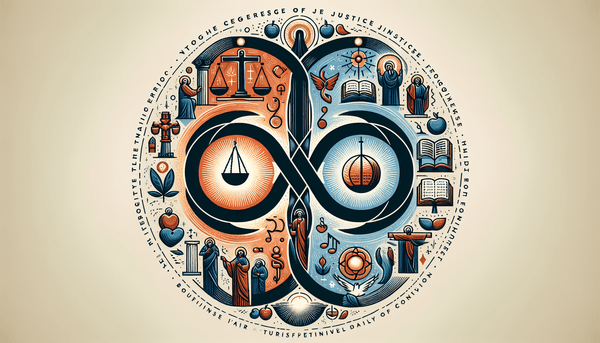The Teaching of Jesus on Forgiveness
Forgiveness lies at the heart of Jesus' teachings. It is not merely a suggestion but a fundamental requirement for those who follow Him. 'For if you forgive other people when they sin against you, your heavenly Father will also forgive you,' Jesus explains in Matthew 6:14-15, emphasizing the reciprocal nature of forgiveness. This principle of mutual forgiveness is echoed throughout the Gospels, as Jesus advises Peter to forgive 'not seven times, but seventy-seven times' (Matthew 18:21-22), symbolizing an infinite capacity for forgiveness. The act of forgiving is also seen as a pathway to reconciliation and healing, as stated in Luke 17:3-4. By following the teachings of Ephesians 4:31-32, which call for kindness, compassion, and forgiveness, and by heeding the advice in Colossians 3:13 to forgive as the Lord forgave us, we cultivate a heart that mirrors the grace and love of God.
Living in Light: Confession and Accountability
Confession and accountability are vital practices for those aspiring to live in the light of Christ. John 8:12 tells us that Jesus is 'the light of the world,' and those who follow Him 'will never walk in darkness, but will have the light of life.' This light brings freedom and forgiveness, shining through the shadows to reveal the truth. Ephesians 5:11 further encourages believers to have nothing to do with the fruitless deeds of darkness but rather expose them. It is in this act of bringing our sins to light, as we confess to one another, that we find healing and liberation, as articulated in James 5:16. This verse underscores the importance of confessing sins to each other and praying for one another so that we may be healed, highlighting the community's role in the redemptive process. In this way, the light of God's truth becomes our guide, leading us to righteousness and transparency in our walk with Him.
The Role of Community in Fostering Justice and Forgiveness
The Christian community plays a crucial role in fostering an environment where justice and forgiveness can flourish. James 5:16 does not only call for confession but also for mutual prayer, which leads to healing and demonstrates the power of a righteous community. This reflects a broader scriptural theme where believers are encouraged to carry each other's burdens, as seen in Galatians 6:2, and to consider how to spur one another on toward love and good deeds, as taught in Hebrews 10:24-25. Such a community, bound by the love that covers a multitude of sins (1 Peter 4:8), becomes a reflection of God's own love and forgiveness. By forgiving as we have been forgiven, as urged in 2 Corinthians 2:5-8, we build a fellowship that embodies Christ's teachings and becomes a beacon of hope and restoration in a fractured world.
Conclusion
In conclusion, the biblical teachings on justice and forgiveness offer us profound insights into the nature of God and the life He desires for us. Through scriptures, we recognize that justice is not about retribution but about righteousness and peace, while forgiveness is the thread that weaves through our interactions, binding us together in love and compassion. As we grapple with these themes in our own lives, we are reminded to extend the grace we have received to others, knowing that in doing so, we reflect the heart of our Creator. Let us, therefore, embrace the call to live out these principles daily, fostering relationships that are marked by divine justice, boundless forgiveness, and the transformative power of confession and accountability within our communities.
FAQ
Q: What does the Bible say about seeking justice and forgiveness at the same time?
A: The Bible teaches that justice and forgiveness are not mutually exclusive but are intertwined in God's character and plan. For instance, Psalm 85:10 illustrates the harmonious meeting of love and truth, and righteousness and peace. By emulating God's justice, tempered with mercy and forgiveness, we live out the fullness of His teachings.
Q: What does it say about telling sins to each other?
A: The Bible encourages believers to confess their sins to one another and to pray for each other, as stated in James 5:16. This practice promotes healing and demonstrates the power of prayer and accountability within the faith community.
Q: Give me the verse where it says to bring your sins to light.
A: Ephesians 5:11 instructs believers to 'Take no part in the unfruitful works of darkness, but instead expose them.' This verse emphasizes the importance of living in truth and righteousness by bringing our sins into the light.
Q: What does it say about the power of sins when brought to light?
A: When sins are brought to light and confessed, they lose their power over us. This concept is supported by verses like John 8:12, where Jesus states that He is the light of the world, offering freedom and forgiveness to those who come to Him with repentant hearts.






